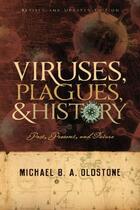Résumé:
The story of viruses and the story of humanity have been intertwined since the dawn of history. The first small cities formed not only the cradle of civilization, but the spawning ground for the earliest viral epidemics, the first opportunity for viruses to find a home in the human herd. This is... Voir plus
The story of viruses and the story of humanity have been intertwined since the dawn of history. The first small cities formed not only the cradle of civilization, but the spawning ground for the earliest viral epidemics, the first opportunity for viruses to find a home in the human herd. This is a story of fear and ignorance, as everything from demons and the wrath of the gods to minority groups have been blamed for epidemics from smallpox to yellow fever to AIDS. It is a story of grief and heartbreak, as hundreds of thousands, sometimes millions, are wiped out in a single year. And it is a story of great bravery and sacrifice, as doctors and nurses put themselves in harm's way to combat yellow fever in Memphis and Ebola in Zaire, and as researchers risk their own lives to test theories of vaccines and the transmission of disease. Now, in Viruses, Plagues, and History, Michael B. A. Oldstone tells all these stories as he illuminates the history of the devastating diseases that have tormented humanity.
Oldstone focuses his tale on a few of the most famous viruses humanity has battled, beginning with some we have effectively defeated, such as smallpox, polio, and measles. Nearly 300 million people were killed by smallpox in this century alone -- more than were killed in all the wars of the twentieth century combined. The author presents a vivid account of the long campaign against the virus, the insightful work of Edward Jenner, who created the smallpox vaccine from cowpox virus in 1796, and the monumental efforts of D. A. Henderson and an army of W.H.O. health care workers to finally eradicate smallpox. The smallpox virus remains the only organism that we have deliberately pushed to complete extinction in the wild.
Oldstone then describes the fascinating viruses that have captured headlines in more recent years: Ebola and other hemorrhagic fevers, which literally turn their victims' organs to a bloody pulp; the Hantavirus outbreaks in the southwestern United States and elsewhere; mad cow disease, a frightening illness made worse by government mishandling and secrecy; and, of course, AIDS, often called "the plague of our time." And he tells us of the many scientists watching and waiting even now for the next great plague, monitoring influenza strains to see whether the deadly variant from 1918 -- a viral strain that killed over 20 million people in 1918-1919, more than twice the military and civilian casualties of the First World War -- will make a comeback.
Viruses have enormous power. They have wiped out cities, brought down dynasties, and helped destroy civilizations. But, as Michael Oldstone reveals, scientific research has given us the power to tame many of these viruses as well. Viruses, Plagues, and History shows us the panorama of humanity's long-standing conflict with our unseen viral enemies, from our successes to our continuing struggles. Oldstone's book is a vivid history of a fascinating field, and a highly reliable dispatch from a worker on the frontiers of this ongoing campaign.















